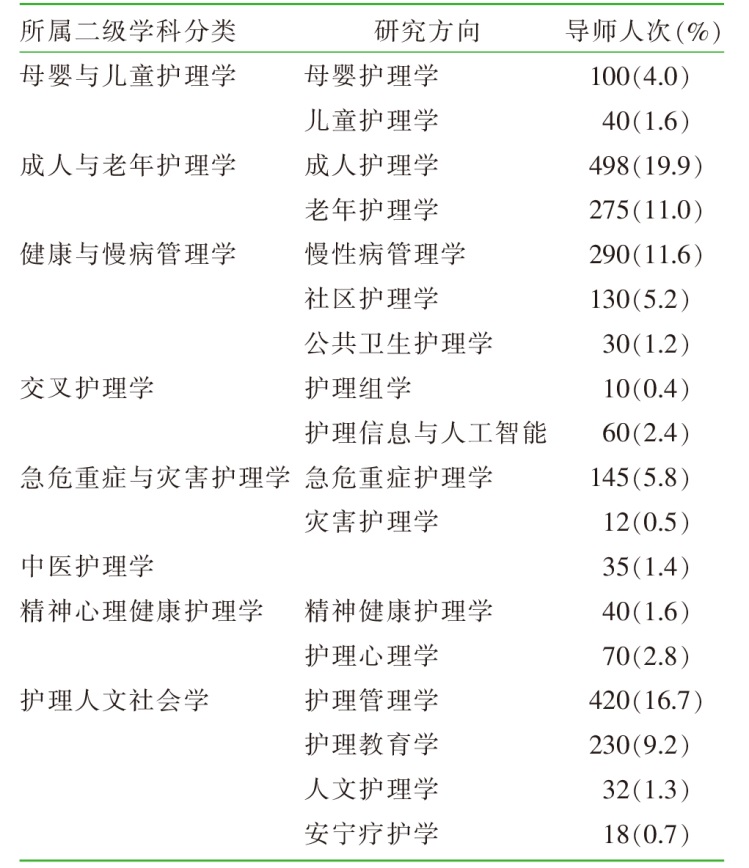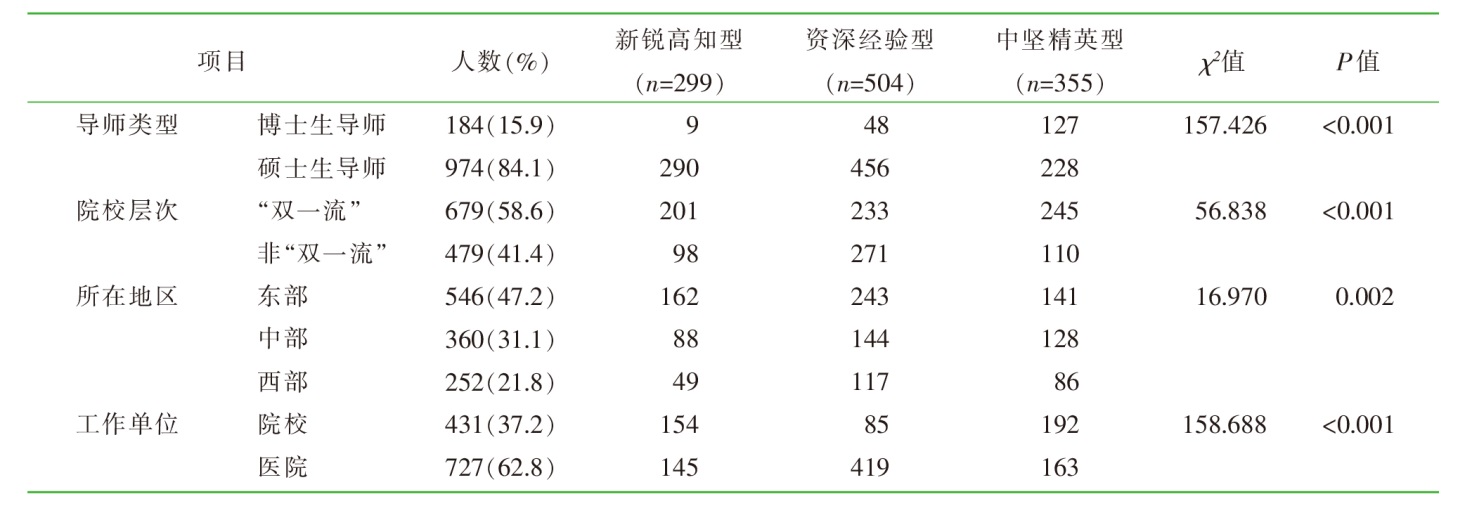| [1] |
教育部. 教育部公布新一批普通高等学校本科专业备案和审批结果[EB/OL]. [2024-05-26]. http://www.moe.gov.cn/jyb_xwfb/gzdt_gzdt/s5987/202403/t20240319_1121113.html.
|
| [2] |
国家卫生健康委. 国家卫生健康委关于印发《全国护理事业发展规划(2021-2025年)》的通知[EB/OL]. [2024-05-26]. https://www.gov.cn/zhengce/zhengceku/2022-05/09/content_5689354.htm.
|
| [3] |
杨辉, 宫丽娜. 我国护理硕士研究生导师队伍的现状分析及建设方案的探讨[J]. 护理研究, 2009, 23(24):2169-2170.
|
|
Yang H, Gong LN. Analysis of the status quo and probe into constructing program of master degree nursing tutor team in China[J]. Chin Nurs Res, 2009, 23(24):2169-2170.
|
| [4] |
温明月, 尚少梅, 贾金忠, 等. 护理学博士研究生导师队伍与招生情况分析[J]. 中华护理教育, 2024, 21(1):42-46.
|
|
Wen MY, Shang SM, Jia JZ, et al. Analysis of the number,structure,distribution and enrollment direction of doctoral supervisors in nursing[J]. Chin J Nurs Educ, 2024, 21(1):42-46.
|
| [5] |
武心怡. “立德树人”视域下护理学硕士生导师队伍建设的现状及策略研究[D]. 扬州: 扬州大学, 2024.
|
| [6] |
苑秋辰, 麻盛淼, 沈晨, 等. Python语言在护理研究领域的应用现状与展望[J]. 中国护理管理, 2023, 23(5):796-800.
|
|
Yuan QC, Ma SM, Shen C, et al. Application status and the prospect of Python language in nursing research field[J]. Chin Nurs Manag, 2023, 23(5):796-800.
|
| [7] |
苑秋辰, 杨浩杰, 麻盛淼, 等. 基于Python语言美国国家科学基金会护理-信息-工程学相关立项情况分析[J]. 军事护理, 2023, 40(6):112-116.
|
|
Yuan QC, Yang HJ, Ma SM, et al. Analysis of nursing-information-engineering-related programs funded by the national science foundation of America based on Python[J]. Mil Nurs, 2023, 40(6):112-116.
|
| [8] |
Donini U, Donini S. #6419 Python language to apply data science method to daily dialysis patient care[J]. Nephrol Dial Transplant, 2023, 38(Supplement_1):I717-I718.
|
| [9] |
中国学位与研究生教育学会官网[EB/OL]. [2025-05-26]. https://www.acge.org.cn/index.htm.
|
| [10] |
杨志仙, 陈蜀, 董美宏, 等. 我国护理学硕士研究生招生现状及分析[J]. 中华护理教育, 2018, 15(10):743-747.
|
|
Yang ZX, Chen S, Dong MH, et al. Current status of recruitment of nursing master students in China[J]. Chin J Nurs Educ, 2018, 15(10):743-747.
|
| [11] |
硕士专业目录_中国研究生招生信息网[EB/OL]. [2024-05-26]. https://yz.chsi.com.cn/zsml/zyfx_search.jsp.
|
| [12] |
博士专业目录_中国研究生招生信息网[EB/OL]. [2024-05-26]. https://yz.chsi.com.cn/bsmlcx/cx/dwIndex?dwmc=&zymc=%E6%8A%A4%E7%90%86%E5%AD%A6&dsxm=&xxfs=1&yjfxmc=.
|
| [13] |
林敏, 陈京立, 朱佳楠, 等. 新医科背景下护理专业研究生教育培养的趋势分析[J]. 中华护理杂志, 2020, 55(5):769-772.
doi: 10.3761/j.issn.0254-1769.2020.05.0028
|
|
LIN M, CHEN JL, ZHU JN, et al. analysis of factors influencing training transfer in oral specialty nurses[J]. Chin J Nurs, 2025, 55(5):769-772.
|
| [14] |
张慧兰, 王丹, 罗羽. 护理研究生导师队伍现状及AGIL模式指导下的建设研究[J]. 医学与社会, 2016, 29(11):92-95.
|
|
Zhang HL, Wang D, Luo Y. Study of present situation and construction of nursing postgraduate’s tutor team under guidance of AGIL model[J]. Med Soc, 2016, 29(11):92-95.
|
| [15] |
约翰霍普金斯大学. 约翰霍普金斯大学护理学院教师名录[EB/OL]. [2024-04-24]. https://nursing.jhu.edu/faculty-research/faculty/directory/.
|
| [16] |
宫建美, 杜建时, 韩冬梅. 护理学二级学科构建问题分析及对策[J]. 护理学杂志, 2019, 34(4):65-67.
|
|
Gong JM, Du JS, Han DM. Problems and countermeasures in construction of sub-majors in nursing education program[J]. J Nurs Sci, 2019, 34(4):65-67.
|
| [17] |
窦艳华, 罗宇, 南江, 等. 护理组学的发展现状及展望[J]. 军事护理, 2025, 42(1):21-24.
|
|
Dou YH, Luo Y, Nan J, et al. Current status and prospect of nursing omics[J]. Mil Nurs, 2025, 42(1):21-24.
|
| [18] |
国务院办公厅. 国务院办公厅关于加快医学教育创新发展的指导意见_教育_中国政府网[EB/OL]. [2020-09-23]. https://www.gov.cn/zhengce/content/2020-09/23/content_5546373.htm.
|
| [19] |
张庆华, 范少罡, 甘维, 等. “双导师制”护理硕士专业学位研究生临床实践现状及需求分析[J]. 全科护理, 2022, 20(2):230-233.
|
|
Zhang QH, Fan SG, Gan W, et al. Clinical practice status and demand analysis of “double tutorial system” nursing master degree graduate students[J]. Chin Gen Pract Nurs, 2022, 20(2):230-233.
|
| [20] |
周欣馨, 史岩, 陈勤, 等. 护理硕士专业学位研究生“双导师制” 实施现状及建议[J]. 中华护理教育, 2024, 21(8):956-961.
|
|
Zhou XX, Shi Y, Chen Q, et al. Implementation status and suggestions on the “double tutorial system” for master of nursing specialist students[J]. Chin J Nurs Educ, 2024, 21(8):956-961.
|
| [21] |
李姮, 石美霞, 吕丽芳, 等. 2014年—2019年山西省护理专业学位硕士研究生就业满意度现状及影响因素分析[J]. 护理研究, 2020, 34(14):2529-2534.
|
|
Li H, Shi MX, Lü LF, et al. Analysis of status quo of employment satisfaction status and its influencing factors among postgraduates with nursing professional degree in Shanxi Province from 2014 to 2019[J]. Chin Nurs Res, 2020, 34(14):2529-2534.
|
| [22] |
赵将, 张培莉, 王志栋, 等. 护理学专业学位硕士研究生招生现状与对策[J]. 护理研究, 2016, 30(21):2574-2576.
|
|
Zhao J, Zhang PL, Wang ZD, et al. Status quo and countermeasures of enrollment of postgraduate students in nursing speciality[J]. Chin Nurs Res, 2016, 30(21):2574-2576.
|







